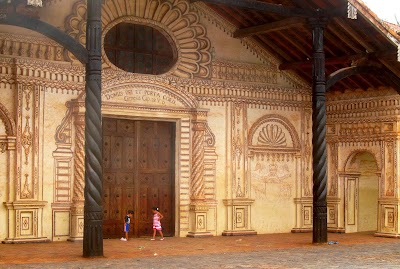 |
| One of six missionaries on the loop |
The river doesn’t so much flow as sit, vast and heavy, like a flood.
The two boys jump in to the muddy waters and spit arcs of brown, smiling happily, shining in the sun. They dive below the surface then, unseen, to untie and then drag a raft of shaggy planks out from among the many jumbled at the shore. I hear the burble of an outboard motor approaching from across the river, a raft nearing us with a silver pick-up truck filling it from bow to stern. It rolls and yaws as the motor fights against the river’s invisible force. Hidden among the gurgle of the motor is a noisy hubbub of the Latino workers. They holler and shout, laugh and whistle, energetic and happy for the brief moment of work among the many hours of lethargy and wait spent besides the river. I turn and see a motorbike speeding across the hard sandy floodplain towards us, feathers of dust rising in its wake. The pilot is a huge man who dwarfs the bike, making it appear as if it were for a child. When the man steps from the toy-machine to turn toward me he appears square, like a shoebox with a penny for a head.
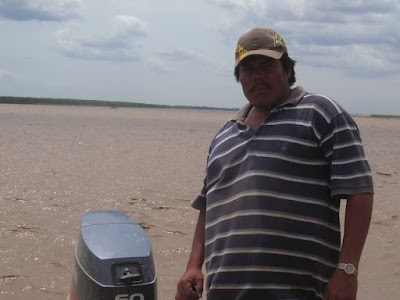 |
| This rather Mexican-esque man took me across the Rio grande…Señor Shoebox |
The man is the boat pilot, the boss. Without having to break his stride, the pilot walks from his bike to the raft and steps aboard just as the two boys nudge it against the shore. I’m called to push the bike on, the boys clamber aboard and the pilot pulls the starter rope.
Sat on the bike, I plant my feet wide to steady myself and in doing so catch my boot on a long bent nail. I know it is long because there it is, almost all of its six inches and looking around more closely I notice its bent brethren poking out here and there like wild mushrooms, all heads and elbows. Some of the wood sits loose in the bottom of the creaking raft, as structurally useful as a paddle.
Foolishly I had pushed the bike in nose first so that now, as we approach the far side of the river, I realise that I’ll have to drag the bike out backwards. The square man smiles at my revelation, shiny teeth lined with gold, he knew my mistake all along. Worse is that the flat bank of entry is instead on the other side a steep slope of soft sand as high as a man. The pilot lifts the motor, a dry throaty gurgle, and it clicks up in its cradle and is turned off. He then begins to fettle his teeth with a toothpick held between plump finger and thumb. He won’t be assisting with the bike then. Luckily the boys and others on the far side do help, six all told, managing to find somewhere to place a hand on Rodney and heave him out and up the steep sand inch by inch. Laughing and panting at the top of the bank, we all shake hands and wipe sweated brows, whilst Square Man walks calmly up to the bow, flicks the toothpick into the river and steps on to the sand with not a rivulet of sweat on his brow. I’m almost certain I can smell the detergent from his shirt which looks clean and starchy crisp. A silence falls now as he steps over from the boat, it’s time to pay. There’s an odd sense of tension, the quiet, him waiting, the teenage staff watching like jackals and vultures, as if I may attempt to ride away without paying for “the goods”. The price is actually fair and there is tangible relief as money changes hands. It is quickly split into decreasing cuts, the last of the helpers looking particularly forlorn at his own share. I’m instructed by Square Man how to get off the plain and on to the road…..and my impression is I should do just that, pronto.
After the dirt here, the road joins the main branch north-east from Santa Cruz, paved. There are Jesuit missions marked on the map by asterisks and these are linked by a long loop of red which later turns yellow. And so my goal is simple, to run the loop. I expect no difficulties but when I reach San Xavier and the first asterisks, I find that the locals know little about the missions, nothing in fact, nor even the word, mission. Synonyms, cognates and pronunciations fail one by one as I try asking for; Jesuits, church, big church, big old church, and more besides, but there are no answers, just blank looks. Eventually I find the mission, in the next town – I wasn’t in San Xavier at all. Now though, with the delay, it is late and San Xavier’s mission doors are sealed, thanks be to God. However, the exterior of clean white paint, contrasting dark twirls of wood and regal gold artwork are more than enough for me. Truly divine.
I speak with the locals, leaning in their doorways as they watch their children idle in the dust and grass. I ask them about camping, “sometimes the tourists camp in the plaza,” they say, but their twisted faces suggests that perhaps it’s not wise, or not wanted. In any case I don’t rate too highly my chances of finding a private bathroom spot in the morning. The police offer less assistance and I return to the bike thinking over the ride here, trying to remember any opportunities I may have missed or forgotten, even half chances. But there were none, certainly no clear chances. The only thing I do remember is a crossroads and the two side-roads leading off from it which might provide some feint opportunity, I’ll have to try those.
A broad road of smooth dirt leads off on either side of the crossroad. Too smooth. It must be busy, well used, populated. I look at each in turn, left and right, left or right? Sometimes just deciding where you want go is hardest, getting there is easy and the goal always so simple. Left or right? Looking for some clue, some sign…some reassurance. The wrong choice here could make for a bad night, or at least a long one. There’s little in it though, so I go left.
The trail is lined by fences on both sides and beyond them fields of green crops and pasture. I pass many locals on motorcycles who have curious looks as they head into town after a hard day’s work. It’s clear I won’t be able to camp here, at least initially as it’s impossible to leave the road. If it continues in this way I will have to turn back and attempt the opposite trail, though I don’t imagine that will be much different. Instead I continue onwards, hoping that road will change in my favour until I’ve gone so far as to have no chance of returning to the other trail in daylight. Without any option I push on still farther, dusk falling, until suddenly things change, miraculously the fences stop, the land is wooded and open. I daren’t question why and without hesitation I turn sharply from the road up a step almost as tall as the wheel itself but no match for my desperation to get off the road to camp. My feet are bucked from the foot-pegs as I summit the step, I waiver and almost tumble before recovering. I dart and weave through tall grass and bushes, hushing and snagging on the panniers and my trousers. I pray no one is passing on the road, watching at my back as I aim towards a small cluster of trees. There, amongst the branches I hear the invitations of parrots squawking “HERE! HERE!” and as I bound toward them I’m sad to see them fly away. I shut off the engine and at last remove my helmet to rub weary eyes . A long way to camp, but in the end a fine spot.
| I had to travel very far to find this spot, all the same it was a lovely spot. |
It’s warm and sunny, and I can sit out until late in the evening in just T-shirt and shorts, amongst tall dry grass, with birds in the trees and ants at my feet. What a change from the cold barren Andes where I had to be wrapped up in the sleeping bag by 6:30pm or struggle to then warm it through. It’s not just the climate that is different, but also the people, their things and their places. The towns I’ve found that whilst they are not huge urban areas, are long single boulevards of hectic bustling life. There are tuk-tuks, taxis and moto-taxis, cars and trucks, bicycles and buses, and of course there are people, in hot grimy clothes on red muddy streets. In contrast to the Andes the populous seems younger here too, or – more correctly -there are teenagers, where in the highlands there seemed to be few. In fact, the majority of people here in the lowlands seem to be children and teenagers; going about in dentist/lab-coat like school uniforms, playing video games at Playstation rooms and facebooking in internet cafes, eating unhealthy snacks from street vendors, or else blitzing the streets on their 125cc Chinese motorbikes. These bikes are stripped of all fairings, dials and lights for a cool, retro, naked bike look. Continuing the cool they are usually ridden with helmet carried not on their head but in the crook of their arm, and usually with a giggling girlfriend on the pillion seat. In the highlands there are few motorcycles, driven mainly by more mature men. It seems common for the teenagers, once old enough, to move away to the main cities, often to study or else in search of modern life, work, or – I am told- in search of the glamour they have seen in the TV soap operas.
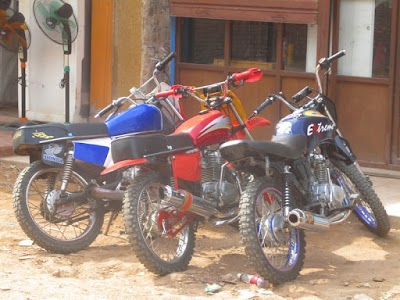 |
| The locals like their bikes minimal, no lights, no electrics really, no speedo, no rear end save the seat, no stickers (SHOCK!) and a MASSIVE booming exhaust. |
Whilst they won’t find glamour or glitz they will find a certain way of life in the lowlands that has to some degree, many of modern life’s “pleasures”; alcohol and bars, motels (brothels), fashion (in a sense), electronics (copies), food (deep fried), money (cash crops), motorbikes (Chinese), cars (“Ford Ran-Gurs”) and no doubt some of the Soap Opera like drama that accompanies a town of drunk men, brothels and bargain-priced tarty clothes. But I might be painting a false image here, it’s not all debauchery, alcohol and tarty teenagers. These single avenues are full of a variety of temptation in other, more acceptable guises and in the avenue people bustle and barter, buying and selling at stalls, shops and on foot. The key to selling in the Latin market is clear; make people aware of the product and put it within easy reach. Maybe that’s every market but in Latin America this generally means putting the product in your face, under your nose or failing that just everywhere. If a product is there and people are liable to pass by it, then most likely they won’t pass it by. Even buses are susceptible with vendors using elevated platforms – think upturned broom-handle with a shelf – which reach up to bus windows to put racks of crisps, chocolate, nuts and sodas tantalisingly within reach. They can’t resist. It is laughable. And busyness breeds business, crowds swell curiosity. I could sell a piece of old rope, provided it was fried. Honestly I could.
Historically these busy backwaters have all grown up thanks to the work of the Jesuits in the 1700s who first created them. Originally this was to offer the – then nomadic – Amazonian tribes a fixed meeting point and to guide introduce them to Christianity. These also served to link up other Jesuit missions as far afield as Brazil and Paraguay (then of course a wild Amazon, not like today) and of course as trading points. It is perhaps this historical movement of people, of much passing traffic that has created these long towns which depend so heavily on the vast numbers of passing travellers rather than the core of actual residents. The reality then is that now these towns have become busy bus and truck stops as people and goods make their way to and from Brazil, with the locals fighting for every customer. It means that the centres of these towns – away from the main through-route – provide some of the quietest streets and some respite. There the hectic bustle calms considerably and movement slows to a shoe-shuffling snail pace more in-keeping with the stifling heat.
In the centre are the missions, though originally these didn’t last long, thanks mainly to the changing hands and creating of new countries of independence in South America (i.e. the influx of Portuguese after the earlier Spanish) and by 1750 few actual Jesuits remained. With the later rubber boom more Mestizos (a grotesque word that means people of mixed Spanish/Portuguese/Native Indian descent) arrived, outnumbering and eventually eradicating the natives. Much later, from 1972 until 1999, a Swiss architect (and Jesuit) named Hans Roth worked at restoring the missions which had fallen into dilapidation. Thanks to his efforts I am able to see them in their current and rejuvenated splendour on this long loop of road from Santa Cruz, north east all the way to the Brazilian border, south to San Jose de Chiquitos, and then back around to Santa Cruz city, almost 1000km.
The next morning I return to the mission in San Xavier, stopping first at the market to buy bread and fruit. After the long ride in from camp, I’m already hungry and I chew terribly stale sweet breads as I make my way back to the mission. Thankfully today the doors are open and I find the interior is airy and fresh – unlike the bread – and as with the exterior the mix of European and native building techniques and materials continues in a really fantastic blend. The sun throws oblongs of light onto the square-tiled floor and the rows of plain dark pews and a shaft of light hits the golden alter. Completely in contrast to the almost bland flooring and plain pews are the twisting pillars of pale wood spiralling up to the ceiling. This ceiling rests on walls painted with golden cherubs strumming harps and floating over rather austere looking confession boxes. I wonder what I would confess? “I’ve not worked a day in over two years and I’ve left a trail of craps all over the globe!”
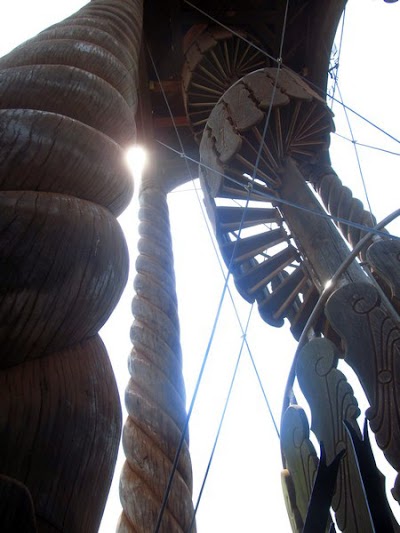 |
| The steps to the bell tower. |
In a room behind the alter, a door of rough wood leads me outside into the enclosed garden and courtyard. At one end spiralling upwards towards heaven is the tall dark bell tower, its bells silent, hanging a bluish green with decay, religion entirely. In fact the whole church is silent, not a single person at prayer, though I’m sure they must come, they should for the church is beautiful if nothing else. I leave then, half empty and half full of nasty bread, eager to pursue the loop, to find more of these angelic buildings.
 |
| Then heading further east towards the Brazilian border, on a long loop taking in 6 more missionaries |
The road is as straight as a spear, heading to the heart of the jungle and abruptly, seemingly at random, it turns to dirt bright red as from the termite mounds of Zambia. Whilst straight the dirt at least gives me something to concentrate on where the asphalt was lacking. There is hardly a break in the trees alongside the broad road and the few villages I pass are not hostile exactly but somehow unwelcoming. Perhaps they are tired of Mission tourists or maybe it’s just closer to the Brazil and the common no-man’s land feeling felt near borders, making me think again of Zambia and the border with Congo. (All just perception though).
The road is very wide and rutted from the rainy season. Small trucks making their way back west to Santa Cruz yaw slowly this way and that. On the bike it’s fast and easy going but even so it’s a long time before I reach the second mission in Concepción. Similar to the first but with artwork somehow less refined, more colourful but a little gaudy.
Before reaching a forth mission in San Ignacio I consider stopping to camp but the dense jungle means that there are few places to leave the road. Several small rustic villages look interesting, quiet and might help provide me shelter. I pass several not really sure at each if it is “the one”, or if I even want to stop and ask at all; it’s been such a long time since I asked to camp because I just haven’t needed to. Then the next village hits a chord. There is often that feeling, a place that I’ve never seen but feels like a vague memory, soft, blurry and missing detail, as if I’ve dreamt of it, or been there long ago. It gives me a reassurance that my stopping here is preordained, that this is exactly where I’m meant to be, even going so far as to think that maybe I haven’t messed things up – generally speaking in life – after all. I actually think all of this a little way beyond the village, standing beside the bike, part of me still not quite sure, trying to pluck up some courage, out of practise, but I tell myself, this is where I’m meant to be, I’m in the right place.
 |
| In the right place, Pablo was more than quick to offer his space. Here he shows me his cheese press! |
I turn back and ride to the edge of the village which fronts on to the road and there’s Pablo, coming over, smiling like an old friend who’s been expecting me, like he’s had the same blurry future-memory as myself. There is no doubt that I can camp, in fact it feels as if I needn’t even ask. Before I’ve spoken I find we are all of us sitting down together on plastic chairs outside on the yard as the cockerel pecks at the bare earth, the sun setting, drinking coffee and laughing. Whilst we have the chairs, the girls of the family sit cross legged on the hard dirt floor in a triangle, plucking nits from the next, from the next, from the next, from each others smooth dark hair. As the boys finish up playing football on the large patch of grass central to the village, I begin the magic show; setting up my tent beneath an arbour that would drip sap all night. As always the tent poles bring the biggest smiles from the family as the segments unfold into a pole and then bend into incredible arches to help make a sheet a home. Then the bed, blown up with a “pillow pump”, and finally the petrol stove lit with magic straight from my fingers (a flint), fuhGOGH! And they jump as the spark catches and a quick lick of flame dances over the ground. The stove flickers orange and splutters before settling into it’s steady blue roar. I make coffee for myself and Pablo which brings a nice smile to his face. I return to the tent then in darkness to cook and am followed by a small mob. The tent porch fills with faces edging ever closer, old and young alike, mouths agape like children watching TV.
“What’s that?” asks the older girl,
“It’s….what, this? It’s carrot……do you want some?”
“Yes.” No please, thanks or even hesitation.
I slice a piece and pass it to the girl. I continue chopping the rest of the carrot and tossing it into the boiling stock as the girl nibbles experimentally at the edge of the carrot slice, and then smiles. She’s never eaten carrot before. Later I would hear her talking excitedly to her father, Pablo, and her mother about how she had just been eating carrot and peas and sweet potato, and I would notice particularly how she had to pronounce “zanahoria (carrot)” very carefully as if it was a foreign word and difficult to say. There isn’t just her of course, those others crammed inside the porch around the stove are also fed and I offer each some of the cooked dinner. They tell me, quite seriously, it is the best thing they have ever eaten and ask how to cook it (boil some stock and throw in some chopped veggies, simmer for as long as your hunger will allow, eat). I consume a small fraction of my dinner with the majority given away to eager hands and smiling faces. These smiles come at the cost of an empty stomach and later I secretly and selfishly eat my biscuits all to myself….
In the morning I wake from dreams of food, a stomach painful with emptiness and a pillow damp with dribble…as if I tried to eat it during the night. I very sneakily eat a lot of cold porridge only to then be invited for coffee and bread together with Pablo and I feel guilty for being so selfish with my porridge, always so selfish. We sit at a wooden table, rough like bark though worn smooth and made black over the years of meals. Flies are abundant, a million clones look-look, buzz-buzz. Pablo’s wife washes dishes as he talks of the tough day he has ahead, working in the fields. I get the impression that actually Pablo will saunter over in his own sweet time and plod back some time later not having so much as dirtied his machete (I don’t mean this nastily, just Pablo was extremely laid back).
Pablo is called by his daughter from outside and he saunters out momentarily to milk her cow leaving me in the company of his wife and a squadron of flies happily licking away at the grimy table. His wife becomes friendly, chatty and outgoing where moments earlier in Pablo’s presence she was diminutive and silent. She sings along to the radio but complains about how she must always buy batteries for it. I tell her she should sell it and buy one that works from the mains electric, an empty socket right next to the radio. She says it is too expensive. I wonder if I should buy her one, but the idea is quickly quashed by my golden rule, cultivated in Africa, to be careful not to act like a gringo (mzungu) charity. I cover Pablo’s cup with his plate to protect it from the flies, but his bread remains easy pickings for them – though to be fair they seem quite content with the grimy table. When Pablo returns he looks a bit bemused as to why his plate is on top of his cup and smiles to himself, “gringos! aren’t they strange!” When he goes to bite his bread and is joined by four flies also tucking in just at the end of his nose, he is unperturbed.
”Did you get much milk.” I ask.
”5 litres.”
”Hm, poco.”
”Do you have cows in England?” he asks.
”Yes. Well, I don’t have any, but there are lots. Only big farms now, each with maybe 200 cows.”
”200! How much milk do they make?”
”I don’t know, maybe 20 litres each per day?”
”20 litres!”
”Yeah, maybe it is the climate, lots of rain so we have lots of good green grass!” then I say, gesturing to the roof, “we don’t have grass roofs though!”
”Ah, you have tin roofs….” he says, “it is better.”
”No, there’s not many with tin, people think it’s a bit ugly, we have slate (I actually say “stone” because I don’t know the word for slate). Does the grass roof let the rain in?”
”No, no, it is very good, but after a while it rots and we have to change it.”
”How often?”
”Maybe once every two years…I want a tin roof but it is too expensive.”
”I don’t know, they make a lot of noise in the rain, you won’t sleep and the grass is free!”
We go outside and get some photos of the house, the camera is shown around the family whilst I look more interested in Pablo’s cheese press. I take photos of it and I’m asked to take photos of the chicken, the dog.
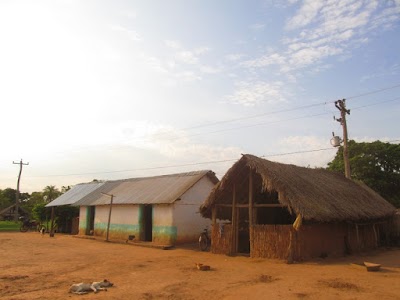 |
| And this is house! He loved looking at my equipment, and drinking coffee….though he had a little less to tell me, though I tried really hard to find some questions…. |
| Beneath the arbour, a lovely peaceful village in the Amazon |
Farewell I say and greedily, selfishly I store away some memories, a few paragraphs in this, my story. And what have I left them? Nothing. And still I wonder if they’ll remember me.
White butterflies fill the air, like leaping hearts, jumping from the grasses at the verge of the road, hundreds, perhaps thousands of them for many kilometres. A junction and a side road slicing north, a band of red mud between the vast green, heading to Noel Kempff National Park. I’d wanted to visit there but had forgotten about it on grounds of time limit; my visa soon to run out. Even so I’m tempted, but on top of the issue of time I’m also lacking fuel, money and a reservation, all of which mean that with a pang of regret I continue east.
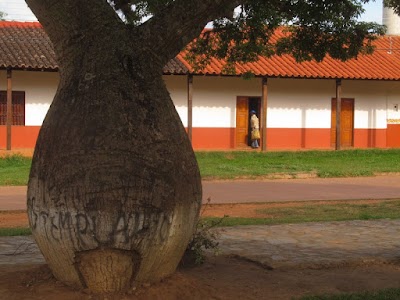 |
| In San Xavier, I’ve seen a few of these bulbous trees! |
 |
| I want my house like this… |
 |
| Inside…here the altar |
 |
| Some instruments of torture perhaps, “You WILL become Catholic, or else sweep my floor infidel!” |
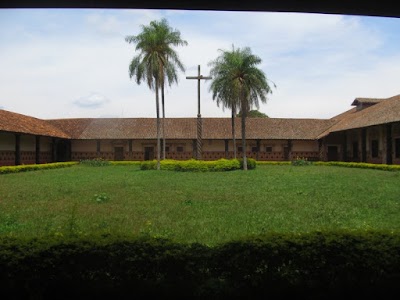 |
| The gardens… |
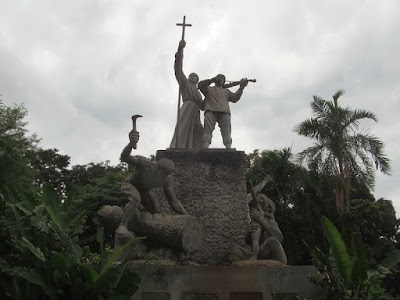 |
| A statue in the plaza…music also played a large part |
 |
| And ANOTHER mission! |
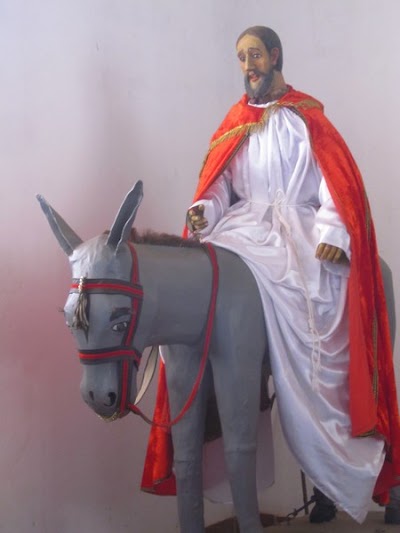 |
| Jesus looking a bit fed up with his slow donkey. |
Soon, with five missions under my belt I reach the sixth and final one in San Jose de Chiquitos. From here the dirt road terminates as it joins the main east-west route which links Brazil, the border of which is now 375km further east, and the city of Santa Cruz. In fact not far from here is the original site of Santa Cruz city founded by Ñuflo Chavez in 1561, it was later moved several times as a result of tribal hostility before being relocated to its present day position 200km farther west. The final mission here is quite different to the others I’ve seen, with a broad stone front – rather than adobe – of plain red and pale orange. It looks more like an Arabian fortress, particularly in an old drawing of the site, with palm trees and a barren, desert-like square. Inside the mission one can see the results of the renovation work and also the discoveries found during these renovations. Whilst carrying out the work layers of paint beneath the exposed layer revealed paintings of Spanish aristocrat….including the King of Spain, Fernando VII. They found up to nine layers of paint, each with its own function, to teach about religion, Spanish military history and even a layer of paintings of jungle animals to calm locals into entering with a more familiar habitat.
 |
| Chicha seller…. |
| King of Spain, Fernando VII, 1810 |
| The exterior of the Arabian-ish fort like mission in San Jose de Chiquitos |
| ….and how it started out (well, phase four or so, the tower was a later addition) |
The paved road bores its way relentlessly to the western horizon and to Santa Cruz taking straightness to a whole new level, and taking me to….sleep. I wake with a gasp as the bike brrrrrrumps over cats eyes as I veer left. Thankfully there’s no traffic. I spend the trip trying to keep my eyes wide open, to force cool air into them in an attempt to stay awake, but…. eventually….I….fall…asleep.
I pull over to eat lunch and try to nap but mosquitoes are abundant, like a plague, instantly on me and poking angrily at my jacket. Hungry, tired and now swelling with itchiness I move on. I try again later but find that if anything the mosquitoes are even more virulent. I’ll have to push on.
When I see a signpost pointing to Laguna Concepción I need little encouragement to take it, away from this paved road and hopefully to an early camp at the lagoon to rest up. Along this dirt road, a second sign post points to some cave paintings and as always the early camp looks like it will have to wait. It’s a narrow undulating road that leads me to a third sign, of much size but little information. One thing is clear, I must walk through the jungle to the caves, but if five minutes or five day’s walk is unclear. I grab my head-torch for the caves and place the helmet on the handlebar, noticing the sponge liner acting pin cushion for the many mosquitoes angrily stabbing its grimy surface in search for blood, my blood, I better get moving.
The harsh sunlight bounces off the green leaves of the jungle making them appear like glimmering mirrors. It’s not the jungle like I’d expect it, tall, shaded and damp, but instead is shorter, hotter, drier. One feature is present and overwhelming; the whine of mosquitoes and I’m forced to keep a good pace to avoid being bitten. Even so my trousers appear almost hairy beneath a layer of mosquitoes from hem to waist. My jacket, which I wear for protection is likewise covered and I watch the mosquitoes stab, stab, stab at shoulders and chest, beneath which I sweat, sweat, sweat. I break of a thin tree branch and whip it in front of my face to ward off the mosquitoes trying to bite my ears, eyebrows, and nose.
The trees thin and then stop altogether, giving way to a lovely raised vantage point over the jungle, a hazy green thatch reaching all the way to the horizon. Savouring the view costs me a dozen or more mosquito bites and I hasten onwards, only to find I can’t. I can’t see where the trail continues beyond this open area. I find it eventually and reassurance comes later when I stumble up to a sign post pointing downhill. It tells me I’m just 15 minutes away. From this point onwards the trail meanders downwards amongst knurly trees and hardy plants and following the path is simply trial and error. Moments of indecision lead to a glut of mosquito bites, eye brows, lips, nose, cheeks, ears, fingers. A stubborn bastard I fight on and on, hoping to find the cave, some little traveller’s gem secreted away, one to boast about. Finally, after an hour or more, I reach a small mangrove of palm trees, shade and black stale water and then the paintings, a little rough, eroded away and hidden behind overgrowth, good but no gem.
| The cave paintings, not quite the hidden gem I was hoping for! |
I sit on one the many fallen palm trees rotting in the damp muck of the shade, also savouring a new silence….there is not the whine of mosquitoes, bliss. Hell is here, or at least just beyond the shade, the mosquitoes, this low jungle and I wonder if I can bring myself to leave and return to the bike. Sitting, I remember back to talking with the Peruvian commandos in the Andes, telling me that of all the places the jungle was the worst of all. It was unanimous amongst them, worse than any desert or Andean ridge. I remember they complained most of the of the insects, of the spiders particularly, snakes and as well, jaguars. They could be right, worse maybe, but perhaps not as dangerous as either. Then thinking back to my time amongst the chilly mountains of Peru, I tuck in to my little lunch, it’s 4pm!
I walk back quickly but carefully, it’s getting late and I need to find drinking water before looking for somewhere to camp at the lake. Coming to a fallen tree the trail doesn’t seem to continue beyond it. I’d felt certain I was on the path, but when I look back I see that the jungle floor shows no signs of a path, just uninterrupted greenery. I’ve lost the way. And I’d felt so certain. I try backtracking to regain it, but there’s no way back, I can’t find it. Things that look familiar lead me only to unfamiliarity until I’m walking tangents and lose my bearings all the more. Lost completely I panic slightly, pushing through the trees without thought, thicker and thicker, desperate to re-join the trail. (on a positive note and in hindsight, I had at least forgotten about the mosquitoes).
Now what. I feel sure that the path is running across the slope somewhere above me. It’s impossible to walk directly upwards and as I’m forced one way then another by trees, plants and bushes – intent it seems on swallowing me up, feeling as if they are physically attacking me. I waiver between certainty and doubt, scratching and bumping and falling through the green and flickering mirrors. Pausing to weigh things up and thinking I’ve gone too far upwards, I look down with a sigh and notice that beneath my feet is the path….Relief. Then the feeling I’m missing something; I pat my head, my head torch. I have an idea where it is, a tree I’d crawled beneath, if I can just retrace my steps….But looking down the slope it’s impossible to see where I’ve been and come from. Instead, hoping my guess is wrong I head down the trail, maybe I took it off when I ate lunch in the shade. I walk back, but it’s not there and resigned I start back again being even more careful and also curious to work out where I went wrong the first time…only to do exactly the same again.
I repeat my path almost exactly, at least it feels so, a tree that looks familiar, a piece of rock, a section that really looked like a path, a fallen tree and above it (I can still see it in my mind now), is the spot where I feel is the last hope to find the torch, but it’s not there. I crawl under and up towards the path, feeling beaten….and there, draped over a thick prickly leaf, is my headtorch! bringing with it great happiness, greater even than finding the cave paintings perhaps! Brilliant!
 |
| Finding the head-torch! By now I was thoroughly annoyed, red hot in my jacket – which I was wearing for protection, the mosquitoes the worst I’ve ever encountered! |
Back at the bike I quickly drink the last of my water…the NEEEEEEE of mosquitoes at my ears, biting my pinkie finger when I tip the drinks bottle up, or my bum the moment I bend over the panniers to clasp them shut as the trouser material tightens to my body. Clipping the panniers closed it is then that I notice it… it can’t be!…NO!…NO! NO! I move around to the front of the bike, grip the front tyre and press my thumbs into it, puncture 77. (Sob) So much for an early camp.
As I heave the bike up and wriggle the wheel axle out, my body squeezes the last of its moisture into my jacket which sticks to me like a wet towel with the added grime of sweat and a few weeks without a wash. I wipe puddles of sweat from my glasses and tell myself as I slip the tire levers in that at least it’s the front tyre and not the back. I’m so eager and so thirsty – and with so much practise behind me – that I fix the tyre and get rolling within 15 minutes. Now to find water.
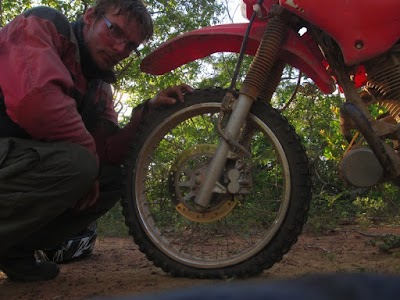 |
| When I returned to the bike and found I had a puncture, I was pretty well going crazy….but at least it was the front tire. |
I ride a short way back to a very small village, a dozen houses no more, neat and tidy set around a green central square of trimmed grass. This neatness and squareness must be a result of the few German descended Mennonites I’ve already noticed, stamping down some authority and organisation. There’s a public water tap behind a locked gate and a metal hinge. I go to ask a man if he minds if I fill my bottles up. The Latino is hoeing his vegetable patch and comes over, smiling. He’s happy to let me get some water and once done I go back to chat with him. He explains that because of recent heavy rains there are more mosquitoes than usual.
“How do you deal with them?” I ask,
“We are used to them.”
“Oh. Right,” I say disappointed, I was hoping for some miracle tip. He stands swatting at his face, then his arm, then his other arm, his leg and then he says – with some surprise – “son bravos!” (literally, “they’re brave”, kamikaze mosquitoes, desperate for food).
It’s nice talking to him, despite the conversation revolving largely around mosquitoes, but as he points out, it’s late and I’ve far to go to reach the lake. Past the trail-head and on to new ground the track becomes narrower still and has that certain something, the feeling that trouble is afoot. The handlebars are wedged one way then jolted another between sharp rocks. I approach a steep drop, like approaching the brink of a waterfall; all you can see is the edge and beyond that nothing but the tops of the tallest of trees. Here not the boom of water, instead just the putt-putt of the engine and the bump-bump of bouncing bags. I approach the edge slowly, dragging the brakes like a paddle, slipping slowly nearer. The bottom of the trail curves around to the left into shade and greenery, out of sight. It’s not a waterfall of course giving me the luxury of being able to stop and think.
It’s not vertical either, far from it and I know I can take it steadily down with little problem. But maybe the luxury of thought is not, perhaps I’d be better off not thinking! My fears bubble to the surface; it’s obvious the trail is very rarely used and the likelihood is that there is a reason for this, one I don’t know, not yet, but one I could find ahead, something impassable. If that were the case then I’d be forced to come back…and back up here. The problem is that I won’t be able to, too rough and too steep for my bike and I could be riding myself into a trap. Yes, better not to think…so I forget and push on downwards. The ADV motto, surely, or maybe it was the Russians, “forward or death”!
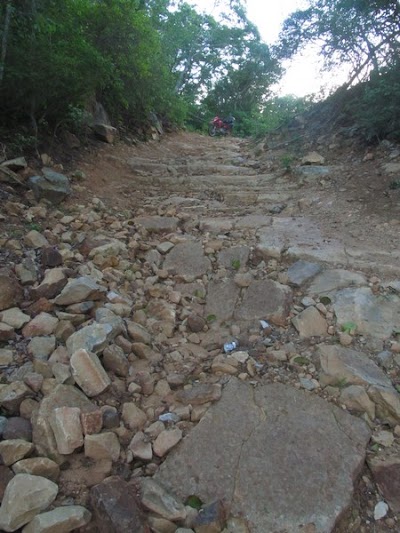 |
| Puncture repaired and back going again, I came upon this lovely trail….the question was, what if I had to turn back, could I get up this? |
I feather the brakes but the rear-end threatens to overtake me on the slabby descent and I only barely manage to slow enough turn the corner at the bottom. The trail continues then along twisting smooth dirt interrupted occasionally by large puddles filling the breadth of the road. It’s easier but I still find reassurance when I see another motorcycle’s tire-track and I follow its weave like a friend. I lift my visor up as visibility worsens, fading light and a few drops of warm rain fogging my glasses and visor
I see something then, in the road ahead, feint, floating, dark amongst the darkness. I squint to try and see it, but all too soon and I’m upon it. There’s a noise, a feeling, Dink dink dink dink, something hitting me, the visor, helmet and my jacket, too with these resonating little dinks. Something seems to move in my vision, blurry and not vivid, like a light after you’ve turned it out, a half exposed image, never quite able to focus on it. Then it happens again but this time I work it out…it’s spiders!
Spiders! I start to piece it all together now; the dark floating shape is the web somehow floating in the road, strung across it and dotted with the black blobs of them! I hit another web, then again and again, six, seven, eight times, Dink dink dink, scurry, scurry, scurry. Each web has a dozen or so fat-bodied black spiders which dink like liquorice drops over me to then scurry over my face and jacket and hands and – I fear – up my sleeves and down behind my collar. I am powerless but to wince, tighten into preparation and shake them off with a shiver down my spine and a scream, “UUUUAAAAHHHH!!! hateit!hateit!hateit!hateit!”
I’m just beginning to think those Peruvian commandos were perhaps right after all until finally I exit the green spidery tunnel and come out into a very flat plain with mountains rising up to the right like the walls of a crater. Across the grassy plain to the left I see the lagoon for the first time and this view, this openness comes like a release and is a relief. Whilst I’d planned to camp lakeside the land looks marshy, the lagoon a long way from the trail through bike-deep grass, not to mention the mosquitoes which could be very bad. I’d been concentrating so long and so desperately on just reaching the lake, that I hadn’t really stopped to consider the obvious; that it wouldn’t really be suitable for camping.
The sun dipping low towards the horizon and with my goal – the lake – reached, I now ride along thoughtless and tired, without any real plan. Several miles on auto-pilot and I pass a group of cowboys at a small ranch as they herd the cattle into the pens for the evening. It’s several hundred metres before I even think to stop and when I do, it is outside the central building of San Juan ranch. A quaint red metal hut with a rustic wooden porch running right around and ahead of me the trail seems to stop, fading to a weave of horse trails. Dotted around are burning fires to ward of mosquitoes and behind me are the cows, who moan and groan as they are put away for the night, each moaning moo perhaps another mosquito bite for one of them, defenceless. The cowboys come over, wearing leather chaps and cowboy boots with tingling stirrups. They wheel around in front of me, as cowboys on feisty horses are wont to do, perhaps thinking to themselves, “well what have we here boys!”
”Where you going?” asks one.
”I was hoping to get around the lake….”
”Na,” he says in the short Latin way, “Road stops here.”
”No chance at all?”
”Na. Just horses, even then only a little way farther.” The others stare from their mounts, arms crossed resting on the pummels of the saddle.
”So, it’s impossible to go around?”
”Hyeh.” he says with a backwards nod.
”Anyway,” says another, “it’s getting dark. It’s very far, where would you sleep?”
”Well, I was hoping to camp, near the lake. I’ve got everything; a tent, a bed, cooker.” I say, patting the bags.
”But what will you eat?” asks one.
”I’ve got some rice, vegetables.”
”And drink?” asks another.
”I’ve got water too,” I say, and they look at each other with mumblings of surprise.
”Just camp here,” says the first. He asks me without checking with the others and I look to them for approval, but they just stare. I say yes.
They jump down then and pull the reins over the horses heads. We talk about what I’m doing here, alone, in this place. As we chat they quickly become more smiling and friendly, perhaps reassured by the fact that I will stay. Some loose horses gallop off in a group together around the corral and then running off in to the distance, playing in the cool air at the end of the long work day. One of the men, still mounted takes off with a sharp kick of the heels, leaning forward as the horse pulls hard and hammers off. Another runs off, grabs a horse tied up and in one movement springs into the saddle, gives a sharp kick and is away, “yeeooooow!! ow! ow! ow!” After a spectacular horse show those loose are gathered back in and put away. The men return breathing hard and smiling with excitement.
| Rancho San Juan |
Some of the cowboys leave. Us remaining move over to a second building, shallow and wide, a kitchen, a bunk room, and outside a table. A woman appears bringing coffee and also with her are her two young children. She is wife to the head cowboy who invited me, though whilst the boss, he explains that he has been working here barely a month. The others are old hands and each have several years experience, even one just 17 years of age who has been here since he was 14. This younger one has a sharp wit and a fast mouth, perhaps picked up from working amongst men. The head cowboy is in contrast quiet and preoccupied with his children. Then there is Old Hand who barely speaks but when he does they are grains of wisdom to which all stop and listen. He moves to his hammock just up from the table and swings himself from side-to-side and free of mosquitoes.
The sun has set, the cows quiet, the fires dotted around us float in the darkness and the mosquitoes diminish though never entirely. We eat a light meal of everything one can make with milk; cheese, buñuelos (deep fried cheese breads) and dulce de leche (condensed milk, though here more like sugared butter). No distractions such as light, TV, nor even a face or noise, complete darkness, save for us shadows. Occasionally there is the slap sound of someone being bitten by mosquito…and conversation.
The Young Gun figures in most conversation, firing off rapid successions of words, usually followed by the laughter of all. Often I laugh myself even though not fully understanding. If not this then when finished speaking they all look expectantly to me for an answer.
“Sorry, what?” I say, “All I caught was ‘hunting’ and ‘man’…… you don’t want to go hunting for men, do you?”
”No soy fresco!” he retorts a little defensively.
The men laugh all the more and I learn a few new words for “gay” in Spanish. In fact they’ve been laughing for some time now, and me being me I wonder if it is actually at my expense. We talk more seriously about hunting, what they hunt for, how they hunt, though I find his rapid speech so difficult to understand, not to mention I’m quite tired too.
“So what do you hunt for?”
”Armadillo….” he lists a selection of animals so fast it’s hard to make out, finishing sarcastically with, “tigre”!
”Y hombres, claro?”
”ha ha! No hombres, only las chicas!” we laugh and he continues, “are you married?”
”No, afraid not. Travelling, motorcycles, eating rice, being bitten by mosquitoes and not washing aren’t exactly what girls are looking for.”
”No they just want sex!”
”And money.” mumbles Old Hand.
”But, really, not even a girlfriend?” he continues.
”Well, I have one.” I say, hoping to end it the topic.
”What’s she look like? Is she nice? Where is she? In England?”
”No, she’s here, in the duffel bag.” Plan B.
”Que?”
”I take her everywhere and only bring her out when I need to, you know.”
”Que?” he looks confused until the head cowboy chuckles and says, “mujer inflablé!” and Old Hand’s sleepy laugh joins in from the swinging hammock too.
“MiiiiERRRde!” he says, shouting the one syllable excessively and slapping the table, smiling. (A pronunciation I quickly picked up)
“She’s much cheaper,” I add, “Shit cook though.”
“I have three girlfriends,” he continues undeterred.
”Three!? Jesus. Really?”
”Yeah.”
”Inflablés?!” says Boss Man with a laugh.
”No!!”
”Feas?” (uglies) I say.
”No! Puta eh,” he says gesturing to one, “son bonitas!” he makes a gesture with his hands, two melons. Big ones. He says something about tetes.
”Where are they, Santa Cruz?”
”One is, I have them all over. So, come on, seriously, you have a girlfriend in England?”
”Four.” I say, just to trump his three.
”Ah, mi-EERRRR-de!”
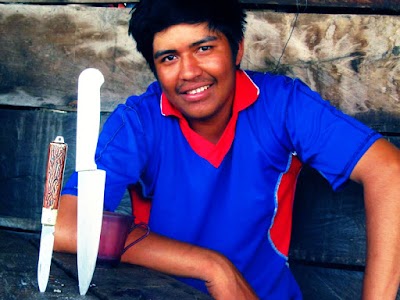 |
| Young Gun, this guys was funny! “No soy fresco!” The names are in my diary, but these were sadly stolen later on the journey. |
Shower time then, from a bucket with a cup and after a sweaty day, it is a great shower taken in the fragile privacy of darkness. Hunting it seems is forgotten, maybe it will be later in the night, though nothing is spoken and already it’s late and they are all in their beds and hammocks and tents, falling asleep. I start to put my tent up next to the bosses’ own on the porch. I see a tarantula next to the wall, a big fella, so I set up quick as a flash, get in and zip up. Of course now that I’ve the opportunity, I can’t sleep and as I lie reading page after page after page after page, one of the guys gets out of his tent and relieves himself off the porch. It is punctuated by a fart, maybe a scratch and a little groan of pleasure. Through the mesh of the tent I see the fires around the ranch have died down and they smoulder away like puddles of lava.
Needless to say I wake feeling quite un-refreshed in the morning. It’s also very early as the day begins with milking which Young Gun is clearly very excited to show me. The men gather tiny one legged stools to sit on, and clean plastic buckets. The wife comes over holding plastic mugs, each with a shot of coffee. These are passed around and each fills his mug with frothy milk straight from the udder to make a freshly whipped cappuccino, what a treat. Whilst I feel like pushing a cow onto its side and using the udder as a pillow, the younger cowboy is exuberant and asks repeatedly that I take his photo as he feverishly milks his cow, yanking the teat hard into the very depths of the bucket, moaning that the milk just keeps coming the bloody udder won’t stop. The cow looks bored. Then Young Gun tells me to take photos of Old Hand and Boss Man’s too, “le-me-see! Le-me-see! Ha HA! MiiiiEEERRRRde! Take one of us both!”
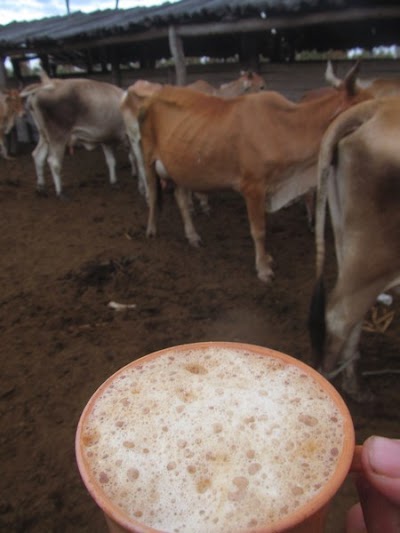 |
| After a bit of dinner and a good chat, morning came. I was asked if I wanted to milk a cow….the woman of the farm came with mugs and shots of coffee, a squirt of FRESH milk and a cappuccino awaits! |
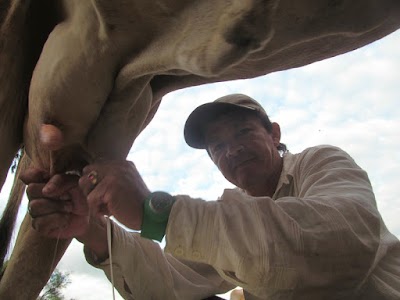 |
| One of the great chaps, this was Wise Chap. |
I turn and see a large American silver pick-up truck, though I never saw it arrive. It’s the owner of the ranch, a city man, fat and with fashionable clothes. Other cowboys are here now too, from another section of the whole farm, six all told, plus a mechanic who is talking to the owner and looking at an old tractor, a hand-down from the Mennonites. The first time the owner speaks to me is to ask if I will go and collect some spare parts for the tractor from a local store. I can’t even begin to imagine that there is a store here and I wonder if I have misinterpreted, surely he means Santa Cruz? But no, he tells me it’s close and so I agree, “OK sure, no problem.” He adds that I should take the mechanic as he knows the part needed and he can also guide me there. I unload the bike of all its luggage and off we bumble.
Normally with the luggage on the bike handles quite badly, the overloaded, deeply sagging suspension wanting to buckaroo the pilot off on any bump. So with a passenger twice as heavy, it’s like steering a medieval catapult through the jungle. We reach some derelict buildings which I recognise from last night. Beyond here is the spider tunnel and the steep section of rocky road. I fear the worst but what I didn’t realise is that the road actually forks here around and behind the buildings and we can continue around the south side of the lagoon. Whilst easier – and less spidery! – there is instead sand, mud, extremely deep ruts and deep puddles. These deep puddles fill the road making them tricky to ride around, the jungle encroaching on the sides snagging bars, pilot or passenger and always the puddles of thick gloop angled like craters which the tire fights desperately against by its very edge. The deep ruts twist off into the distance around corners out of sight, making line choice critical. One picks a line and must then stick to it, only to find an obstacle and having to man-handle the bike across a rut to continue, only then to find the ruts criss-cross each other leaving one stranded in the middle, or else the rear wheel drops in leaving us sideways. After 37km of falling we reach more open arable land only to be overtaken by the big American silver pick-up. Soon after and we reach the shop, a white clap-board house set amongst huge rectangular fields of maize, through which bumbles a tractor piloted by a Mennonite man in blue overalls.
| Slippery as a fish |
The ranch owner steps from his silver pick up, that rich son of a bastard, and queries why it has taken us so long, despite us being filthy with mud and sweat. “I thought the motorcycle would be really fast!” he says. I could say that it is because of assholes using their pickup in the rains that there are impossibly deep twisting ruts, but actually and in all fairness, he says so himself, minus the asshole bit, “I suppose I really shouldn’t use the track in the rains.” He buys us all a soft drink each and between us a pack of large pack of biscuits as our breakfast. We are served by what is best described as an Aryan boy. As blond and tall and blue eyed as one would expect, wearing a set of pristinely pressed navy blue overalls and a checked shirt with its sleeve cuffs rolled millimetre perfect and square just above the elbow. His mother sits sternly besides him behind the counter, nursing baby. She is not permitted to speak Spanish, she is silent and talks only with her eyes. The boy, perhaps 15 years old, can speak to us (being male) and his face says his mother will give him a ruddy good clack if he falls out of line and as such he is as diminutive as a mouse. The shop sells just about everything, from toys to fan-belts.
“Amazing isn’t it?” says the son of a bastard.
”It sure is, they seem to have everything. It’s like Walmart crammed into a post office. How did you ever find it?” I ask because from the outside it is just another German-esque house in the middle of a vast expanse of crop fields and other similar German-esque houses.
”Hmm, I don’t know, I think someone must have told me about it. Otherwise you’d never find it! Come on, eat the biscuits, help yourself.”
”Thanks!”
”Did you get breakfast?”
”Well, just some coffee.”
”Eat then, you must be hungry!” and we all tuck in then quite greedily. “So, you are travelling all over the Americas?”
I reply, but he doesn’t listen. It’s clear he is more interested in his question, his voice, whatever I have to say is worthless to him, and his question seems almost a display of power. It’s clear in his presence that neither the mechanic nor the other cowboy should speak unless spoken to and whilst before they were friendly now they only eat biscuits quietly. Next to each other the differences between the Aryan boy and the Son of a bastard seem even more apparent, with the boy being perfectly respective and well-mannered. The bastard reminds me of a gringo running a mine.
Outside he talks some more, his slaves occasionally giving mutterings of agreement. “They are very strange people,” he says of the Mennonites, waving a biscuit in the air as if it were a cigarette holder or an epiphany, and adds – gesturing to a home made lawnmower, an ingenious amalgamation of a toy car and a bicycle – “but very clever.” He eats something else then, something just for himself which is not shared. He offers me some, I decline. He thanks me then for helping with the parts, “Thanks. Now I don’t have to waste my time driving back.” Extremely satisfied with himself having saved himself a job he gets in his pick-up and drives off, taking along one member of the team to the city as he has time off.
Myself and the mechanic start the long ride back to the ranch. We get stuck in some mud on the way, but as I become more accustomed to the additional weight and also knowing which lines best to take, we fall only once or twice, a vast improvement. It’s lunchtime by the time we get back, feeling as if I’ve done a full day’s riding and famished. However, no sooner are we back and Young Gun is there chomping at the bit to go fishing. Despite tiredness and hunger (nothing unusual), his enthusiasm, the kind invite and without the option of a cool dark hole to crawl into, it is impossible to decline, so we saddle up the horses and go riding towards the lake.
My horse is stubborn and slow (not unlike Rodney then), with wild unkempt fur like fuzzy felt. It will only follow the others reluctantly and rejects all of my commands, in Spanish or – rather harsh – English. As we go we cut off two branches of trees with the machete and later, after a bit of a search through the bush, find a dead cow and slice off a piece of rump. “It wasn’t as dry as I expected,” says Head Cowboy, “I thought it would be tougher by now”. Perhaps it’s been there a while, it sure looks as if it has.
| Slow Joe |
My horse stops to munch on some leaves occasionally, but eventually me and my furry companion reach the lake, though some time later than the others who wait with smiles. It’s a lovely spot and the view here is of the wedge of mountains to the left and the vast plain of the lake, smooth water that looks deceptively as if we could walk upon it, to the horizon and out of sight. The water here barely reaches the horse’s knees and so flat is the land that we can walk a long way into it, and must do, to fish. This also means that the surrounding grassland plain is only barely above the water table, and is therefore a terrible bog, hard going even for the horses, and a good job I didn’t try to camp here last night.
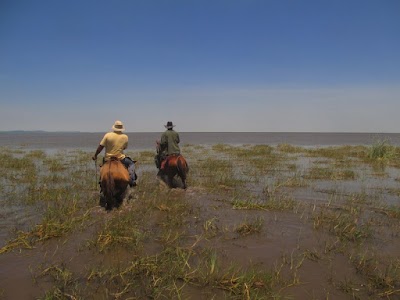 |
| After running some errands for the farm, involving a 74km trip up the muddy trails to a shop I came back to be asked if I wanted to go fishing for piranhas! Sure thing, want to go on horse? You bet! |
We stop then and prepare the two coils of fishing lines which we bait with pieces of the dead cow which I cut with a sharp folding workers knife. Thirty seconds later and we have our first bite and the piranha is slotted onto the branch we cut earlier through its gill and out through it toothy mouth. The second catch takes much longer. We bake in the openness of the lake, occasionally the horses cool themselves and us by flicking water with whips of their tails. A little way off a caiman skulks in the water, a pair of nostrils and a long nose leading to a beady eye. Young Gun took first blood but the Boss then catches seven in quick succession making Young Gun a little angry. “MiiiEERRRRRde!” he shouts as another one slips from his hook and returns empty, “more bait!” he snaps. We have enough fish to feed us but The Boss wisely waits patiently and even seems to let one or two piranhas go on purpose as others nip at the horse ankles. Finally number nine is caught by the Youth and with all satisfied, allows us to begin the ride back to the ranch.
 |
| 30 seconds, number one caught! We caught nine all together to feed us for lunch, the poor horse got nipped a few times! There were caimans too! |
| Boss Man, looking happy having caught seven fishies! |
When we return to the ranch the tractor is almost completely rebuilt. While we were fishing I’d been asked to repair a puncture on Young Gun’s motorcycle and I get started on that and the wife begins scaling the fish and barbecuing them over wood. She makes a fine meal, though from which she receives only seconds and leftovers. The children get the fish-heads which they eat messily with entrails hanging from slimy lips and fingers. The fish is excellent however, though full of sharp and slender bones which makes the meal slow, noisy and messy. I’m even more tired now than the day before, feeling as if I haven’t really stopped since waking up yesterday. The guys try to persuade me stop another night, “we’ll kill a pig and eat a BBQ”. I can tell they really want me to stay, perhaps not to share my own company, which is poor, but for the novelty and distraction I can offer them here on the secluded ranch and its repetitive normality. However, I can see things soon moving from the jolly banter to short-tempered boredom. It’s already late in the afternoon and whilst it makes little sense to leave now I don’t want to ruin the otherwise good memories we all share. Truthfully I am not naturally sociable at all and have to work very hard at it. Up until now I feel I achieved relative success, and to me that’s almost all company ever is, a game, a score. How did I do? Did I make them laugh, happy, thoughtful, interested, inspired? Or did my jokes miss the mark, was I dull, was I selfish, tiresome, did I say something I shouldn’t have? Did I win? The prize; a friend. But now, tired, I’m worried that whilst I’ve done well, I can’t keep this game up, and eventually I’ll lose. I’m scared to lose. So I apologise and say genuine thanks a thousand times, but decide to leave. Better to leave victorious.
I make it out from the muddy road of the lake in good time and stop at a place for a drink, making the mistake of saying hello to one of the Mennonite Women who scowls at me. The Mennonites sit all together, a large family drinking soda from a large bottle, talking with the store owner, who herself does little but take my money. Boys run barefoot, blonde-blonde boys and girls too, like nymphs or pixies straight from the forest with eyes a wild blue and chunky dirty feet with thick soles. I sit at my table as they sit at theirs, listening to them talking a strange mix of German and Spanish, happy and content. Alone I wonder about leaving the cowboys, the ranch and their kind offer. One can spend their lifetime wishing for things and wishing to be a certain way, but sometimes one must accept that we are who we are.
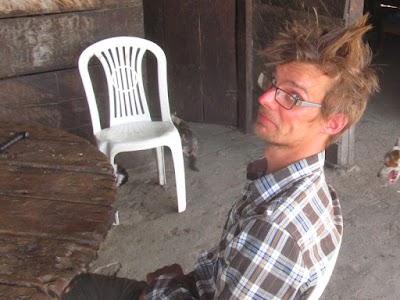 |
| Post lunch Nick, after milking, riding 74km to the shop, fishing and repairing the guys motorcycle tire, I was pretty tired…I was worried about overstaying too…and got going. |
I stop at houses along the way, looking for food supplies for the evening but the only option they tell me, is to reach the main road and the few shops there. When I reach them a woman shop owner asks if I will help three others carry her concrete sink to a truck, she had ordered it but it is the wrong colour. In thanks she gives the men beer and – obviously a good judge of character – gives me a coke. She is friendly and tells me the way to a house which might have some fresh bread. I follow her directions carefully, up a dusty street and into a large open courtyard of a house where I find a young girl playing with her imagination, she’s perhaps seven years old. Her mother comes out, a timid woman, says she might have some bread and goes off to look. With her gone the curious little girl asks me many questions. She is more inquisitive than any adult I have met and as wise as an old woman. I tell her mother as much when she returns with a small plastic bag of steaming hot breads like English muffins, and she agrees that her daughter is especially intelligent. It’s hard to see what this intelligence will gain her here in this village supported only by the passing traffic on its way to Santa Cruz. The inhabitants here are not even farming now as the Mennonites – the Latinos admit – can do it so much better and so much cheaper than they can thanks to tractors and great swathes of land, “they can sell it cheaper than I can grow it!” says one man. The woman’s bread however, is delicious and cheap…tough even for the Mennonites to beat!
I return back into the hot prickly bush on the fringes of the Chaco (more anon) and find a large open patch amongst it all, perhaps an area left over from the road building in the past. Despite the lack of grass and considering the large distance from the lake, the mosquitoes are ever present. I quickly start a fire (a rarity for me) which keep all but the hardiest away, though sadly they have many hardy specimens amongst them! It forces me to retreat into my tent, filling with billowing smoke and even more heat, I surely can’t move the fire and I sure as hell am not going to move the tent so I take what little comfort I can in knowing that at least it’s cooler than Pilcomayo Canyon!
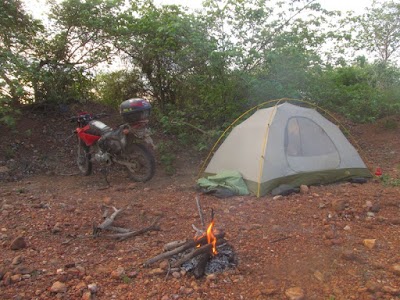 |
| I very rarely make a fire, but the bugs demanded it….it helped, but only a little! |
In the cool of morning there are few mosquitoes and I can leave the confines of the stuffy tent to enjoy breakfast, sat in my underpants. With the air rapidly warming I think about packing up, but I’ve been waiting patiently for this time of respite and feel reluctance to move. A toucan flies overhead and I soon forget my lethargy, throwing down my bowl to chase it, to see it, but too soon and it is gone. Not long after and the heat has become heavy as a weight on my back and I pack sluggishly. Finished, I’m then eager to get moving and feel the cooling breeze on the motorcycle.
Along the way, straight and paved and I see many Mennonites. I have seen Mennonites before, here in recent days and in Mexico where I passed through, each of us staring at each other in some amount of awe, not really understanding each other. I see them sat rigidly and regimented in horse-drawn carts going about their business, often with a 200litre fuel drum angled in the back. Even so they look a bit out of place lining up at the petrol stations in their horse carts. From the rear, all that can be seen of these carts apart from these fuel drums are a tall gangly blonde man holding reins and women and girls in broad straw hats or bonnets. Captivated more than I have been before I pull off the main road to try and get a closer look, but they seem to disappear once away from the main road and I find only Latinos. I return to the main road and continue, all the while looking for German sounding village names on signposts, hoping for a clue or a way in but all I see are signs saying “No Caretas” (no horse carts!). Before I know it I’m at the outskirts of Santa Cruz and its concentric set of ring roads of increasing traffic. I’d have to look harder….


